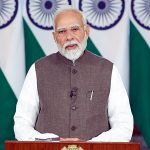Jammu, Mar 06: Union Home Minister Amit Shah underscored the forthcoming significance of elections in India, marking the genesis of democracy in the nation. These impending elections, as Shah emphasized, hold the potential to shape India’s trajectory for the next 25 years.
Union Home Minister and Minister of Cooperation, Amit Shah was addressing the IGF Annual Investment Summit-NXT10 in Mumbai, Maharashtra today. On this occasion, many dignitaries, including Maharashtra Chief Minister ShriEknathShinde, were present.
The Union Home Minister said under the dynamic leadership of Prime Minister NarendraModi, India has witnessed monumental transformations across every sector in the past decade. :The decisions taken in the next five years,” Shah reiterated, adding, will profoundly influence India’s positioning as it approaches the centenary year of independence in 2047”.
Central to the discussion was the remarkable progress observed in Jammu and Kashmir (J&K), previously a center of turmoil.
“Under the leadership of by Prime Minister Modi, the integration of J&K with the rest of India through the abrogation of Article 370 signifies a significant turning point, promoting stability and advancement in the region. This historic move, alongside various other transformative measures, underscores the government’s dedication to fostering inclusive growth and bolstering national unity,” Shah elaborated.
The Union Home minister stated that these elections transcend mere democratic processes and they symbolise a celebration of the synergistic relationship between democracy and security, while ensuring the welfare of the underprivileged, public welfare, preservation of tradition, and technological advancement.
He mentioned that this journey will continue for decades, and the goals set by Prime Minister Modi for India, to be fully developed, self-reliant, and counted among the top economies by 2047, will certainly be achieved. He emphasized that we have the performance of the past 10 years and a roadmap for the next 25 years to attain these goals.
Shah emphasized the importance of evaluating the past decade’s progress by juxtaposing it against the performance of previous regimes. He delineated the stark contrasts between the challenges faced in 2014, including economic downturn, low investor confidence, and rampant corruption scandalsamounting to 12 lakh crore, and the subsequent trajectory of growth and development under the decisive mandate bestowed upon Prime Minister Modi. This era, Shah asserted, has witnessed a departure from the era of policy paralysis to one characterized by proactive governance, policy formulation, and relentless pursuit of national development.
Shah also highlighted the noteworthy decline in the average inflation rate, which stood at 8.2 percent between 2004 and 2014, reaching double digits in 2010, 2011, and 2013, but has since been consistently maintained below 5 percent. He further accentuated the efforts of the Modi government in rectifying banking and forex mismanagement, paving the way for a new era of politics in the country.
The Modi government’s tenure has been marked by a series of transformative decisions, meticulously crafted to steer India towards a brighter future. From landmark economic reforms such as demonetization and GST implementation to decisive actions in national security and legislative reforms empowering marginalized sections, the government’s agenda reflects a holistic approach towards nation-building. The abrogation of Article 370 and 35A, the Citizenship Amendment Act, and initiatives aimed at bolstering education, healthcare, and infrastructure, exemplify the government’s commitment to inclusive growth and national progress.
The Home Minister also underscored the government’s focus on eradicating the systemic evils of dynastic politics, corruption, and policy paralysis, ushering in an era of meritocracy and performance-driven governance. The path to prosperity, Shah iterated, is intrinsically linked with addressing the aspirations of every citizen and fostering an environment conducive to innovation, entrepreneurship, and inclusive growth.
India’s economic resurgence under Prime Minister Modi’s leadership has been nothing short of remarkable. From infrastructure development to economic indicators such as GDP growth, FDI inflow, and per capita income, the nation has witnessed a paradigm shift towards sustainable growth and global competitiveness. The Modi government’s ambitious vision for India’s future, as articulated by Shah, encompasses a wide array of goals, ranging from economic milestones to global leadership aspirations, aimed at positioning India as a beacon of progress and enlightenment on the global stage.
Amit Shah’s address encapsulates India’s transformative journey under Prime Minister Modi’s leadership, characterized by unwavering commitment to national development, inclusive growth, and global leadership. The government’s comprehensive agenda, spanning diverse sectors and encompassing ambitious goals, reflects its determination to script a new chapter of prosperity and progress for the nation.
MILESTONES ACHIEVED
Reduction of inflation rate to consistently below 5 percent from double digits in the past.
Reforms in banking and forex management.
Demonetization to curb corruption and counterfeit currency.
Implementation of Goods and Services Tax (GST).
Addressing issues of Non-Performing Assets (NPA).
Expansion of digital landscape through Jan Dhan, Aadhar, Mobile (JAM) trinity.
Surgical and air strikes to bolster national security.
End of the practice of triple talaq, empowering Muslim women.
Citizenship Amendment Act (CAA) providing citizenship rights to persecuted refugees.
Abrogation of Article 370 and 35A, integrating Kashmir with India.
Introduction of the New Education Policy.
Nari Shakti Vandan Act, providing 33% reservation for women in legislative assemblies and parliament.
Implementation of three new laws to expedite the criminal justice system.








